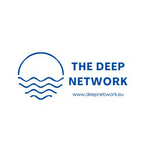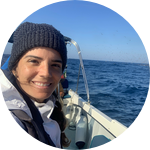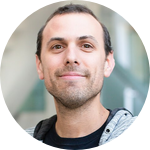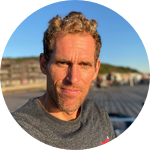About This Project
The deep sea is enriched with metals and amazing life forms. Electroactive microbes can get energy from metals, creating conditions that could sustain high animal diversity in the abyss. With genomic data to expand a large, public diversity dataset, we can use multi-omics and phylogenetics to reveal the electrobiogeochemical basis of biodiversity maintenance. It is urgent to know the role that metals play in such eco-evolutionary mechanisms before they are removed by the deep-sea mining rush.
Ask the Scientists
Join The DiscussionWhat is the context of this research?
The deep sea is a mosaic of habitats where diverse life forms thrive and fuel ecosystem functioning. Over huge areas, the seafloor is covered with metals formed after millions of years, as microbial and animal interactions evolved and shape biological community successions. Findings on high animal diversity in metal-rich sediments, and on microbial cooperation for metal utilization and electroactivity, all relied on environmental genomics.
We will sequence deep-sea sediment DNA to reconstruct genomes and phylogenies, and use multi-omics to integrate electroactive and metal-related functions with animal diversity data published for the same samples. Understanding the eco-evolutionary basis of biogeoelectrochemical mechanisms maintaining biodiversity will also help regulate deep-sea mining.
What is the significance of this project?
The project will 1) advance fundamental microbiology and deep-sea research, and 2) inform policy and management.
Fundamental research. Genomic and multi-omics data on key eco-evolutionary mechanisms will offer new research opportunities and directions. Indeed, omics remain emerging technologies for deep-sea research. Our samples cover the Clarion-Clipperton Zone (CCZ), a deep-sea mining area where genomic data on the role of metals and diversity is crucial.
Decision making. Metals are target for a mining gold rush. Hence, diverse life forms, their interactions, and the services they provide will be lost before we know them. Such knowledge gaps limit governance (International Seabed Authority, countries with metal-rich deep seas) to predict and mitigate the impact of planned mining.
What are the goals of the project?
The project can start as soon as it is funded (started in August).
We will generate lots of DNA sequences (ca. 25 millions) for each of 65 deep-sea sediment samples (DNA extracts await in the freezer): 45 are from the metal-rich Clarion-Clipperton Zone and 20 from 4 other regions, to first find the genomes and functions that are associated with metals.
We will reconstruct microbial genomes and annotate their functions using powerful computer and methods, and specific databases to find the genes and proteins of electroactivity and metal-dependent pathways.
After describing this data in the light of evolution using phylogenetic trees, we will match it to previous data on animal diversity to reveal ecological niches and see if electroactivity and metals-related mechanisms promote high diversity.
Budget
The project was started with the sequencing of DNA targeting specific markers, to detect and analyse the compositions of communities of animals and microbial eukaryotes in 300 samples.
Here, a selection of 65 of these same samples will be resequenced using shotgun metagenomics to identify and perform more insightful analyses on the electroactive and metal-related metabolic functions associated with these animal and protistan diversity.
The cost can be completely dedicated to generating the data (library preparation and sequencing) because the DNA has already been extracted and large amounts of these extracted DNAs are still available for us to fill important knowledge gap and release the digital sequence information publicly.
Hence, although high costs where covered for this project, and we need to get extra funds for very high-throughput sequencing of these complex pools of sedimentary DNA extracts and genomes therein.
Endorsed by
 Project Timeline
Project Timeline
The project relies on already-available DNA extracts from which data on the diversity of animals (and Foraminfiera) has been published. Hence, microbial metagenomes will be produced immediately. Within two months, our analysis pipelines will yield rich phylogenetically-informed genomic, taxonomic and functional classifications. This new data complements previous diversity data for the same samples. Thus, multi-omics integration for interaction detection can be completed in a couple weeks.
Apr 04, 2023
Project Launched
Aug 01, 2023
Prepare a metagenomic sequencing library for 65 samples based on already-available DNA extracts
Aug 31, 2023
Sequence the library of 65 samples on the Illumina NovaSeq 6000 platform to obtain metagenomes
Oct 31, 2023
Perform data preprocessing of metagenomes sequenced at very high throughput
Nov 30, 2023
Reconstruct microbial genomes, and perform taxonomic and functional classifications (focus on electroactive and metal-dependent functions and pathways)
Meet the Team
Franck Lejzerowicz
I am a postdoctoral researcher experienced with multi-omics bioinformatics, biostatistics and molecular biology for the analysis of large microbiome datasets. I completed a PhD studying the diversity of marine, deep-sea microbial eukaryotes at the University of Geneva, and worked as a postdoc on environmental and human gut microbiome projects related to mining and nutrition at UC San Diego, where I participated to developing bioinformatic tools and to the crowd-funded citizen-science Microsetta Initiative. I found that transcending research fields and borders to learn and exchange from diverse experts and enthusiasts is most stimulating and key to promote science and humanities for peace and cooperation in the face of global challenges.
My early-career research is focused on benthic deep-sea and molecular biology, using ancient DNA and multi-omics techniques, to understand the eco-evolution of prokaryotic and eukaryotic microbes, and the amazing Foraminifera. My fascination for deep-sea Life - from molecules to ecosystems - was contented by joining five expeditions, including two across the Atlantic and three in the Northwest Pacific. Moreover, I currently serve as Communications Officer for the Deep-Sea Biology Society.
At the University of Oslo, I work on a project to study microplastic biofilm microbes spreading in oceans, and assess their envrionmental and human health impacts. I will be adjusting the metagenomic and computational lenses through which our international team will understand gene exchange and ecological mechanisms determining antibiotic resistance and other metabolisms.
Alexander Eiler
When my grandfather explained photosynthesis to my 5 year old self my scientific curiousness was instigated. I can still remember that I imagined the flow of protons and elements in various colors. The cycling of elements is still at the center of my research. As such I study microbes since they shape the physical, chemical and biological state of our planet by facilitating the storage, transport, and turnover of elements. To study microbes and their role in the biosphere requires collaborations across the fields of aquatic ecology and biogeochemistry.
By combining omics (including DNA/RNA/protein sequencing and advanced computational approaches) and stable isotope tracer studies we intend to advance our understanding of microbes in the biosphere. The need for such understanding has never been more relevant than now in the light of ongoing global climate warming and massive human-induced alterations of ecosystems.
My original training is that of an ecologist at the University of Vienna and of a microbial ecologist at Uppsala University where I worked on describing microbial diversity of inland waters and the mechanisms underlying patterns in microbial diversity. Later I was a post doc at the Hawaii Institute of Marine Biology working on marine microbes. During my time as an Assistant Professor at Uppsala University I have started to unravel the role of microbes in biogeochemical cycles, in particular microbes' repercussions on climate through greenhouse gas production. Since 2018 I am Professor at the University of Oslo.
Additional Information
This project will yield digital sequence data that will be made public immediately. Since this data is for samples for which diversity data is already available and public, this project will serve as a case study for workshops to train the next-generation of deep-sea biologists, and notably from developing countries and citizen scientists. Workshop material was already developed for a series of bioinformatics workshops at the University of Oslo, and the team leader identified interested venues, incl. during the Workshop on Enhancing Genetic Approaches to Advance Deep-Sea Taxonomy organised by the International Seabed Authority and focusing on capacity building. We believe that sharing digital sequence data and analytic skills is highly feasible, making this project a cornerstone for more Justice, Equality, Diversity and Inclusion in developing oceans solutions globally, and for poorly-funded research groups to tap into rich data and address new questions.
This project will generate deep-sea environmental genomic data to complement previously generated diversity data that represents the most comprehensive digital sequence dataset available thus far for deep-sea mining areas. Extending this dataset with most-wanted, microbial metagenomes will make this project a reference study for environmental genomics in the deep sea. Various institutions are currently trying to set standards for sample metadata and data processing. For this and previous datasets, we meticulously follow standards from the Genomics Standard Consortium and will disseminate the importance of standardization and metadata collection during our workshops.
Project Backers
- 19Backers
- 80%Funded
- $10,575Total Donations
- $556.58Average Donation





